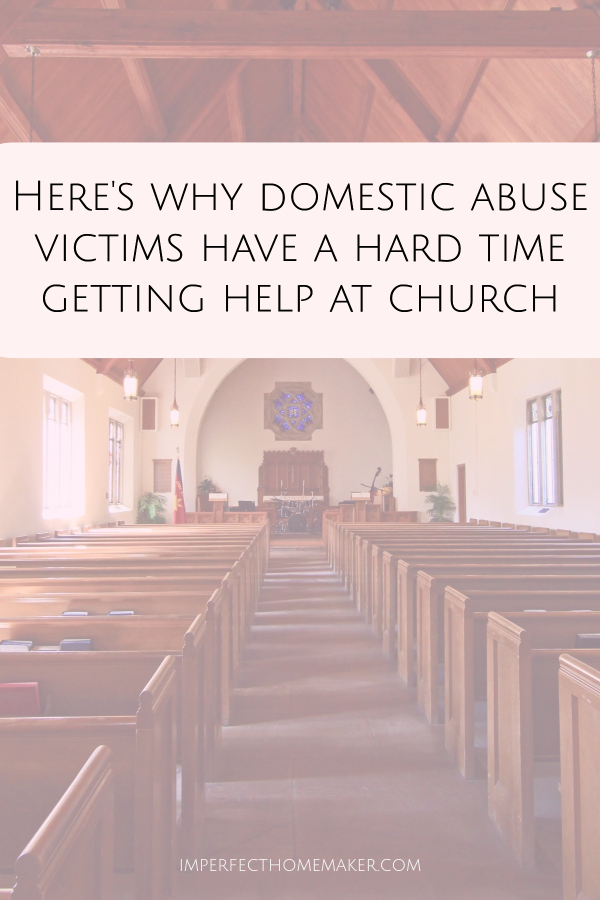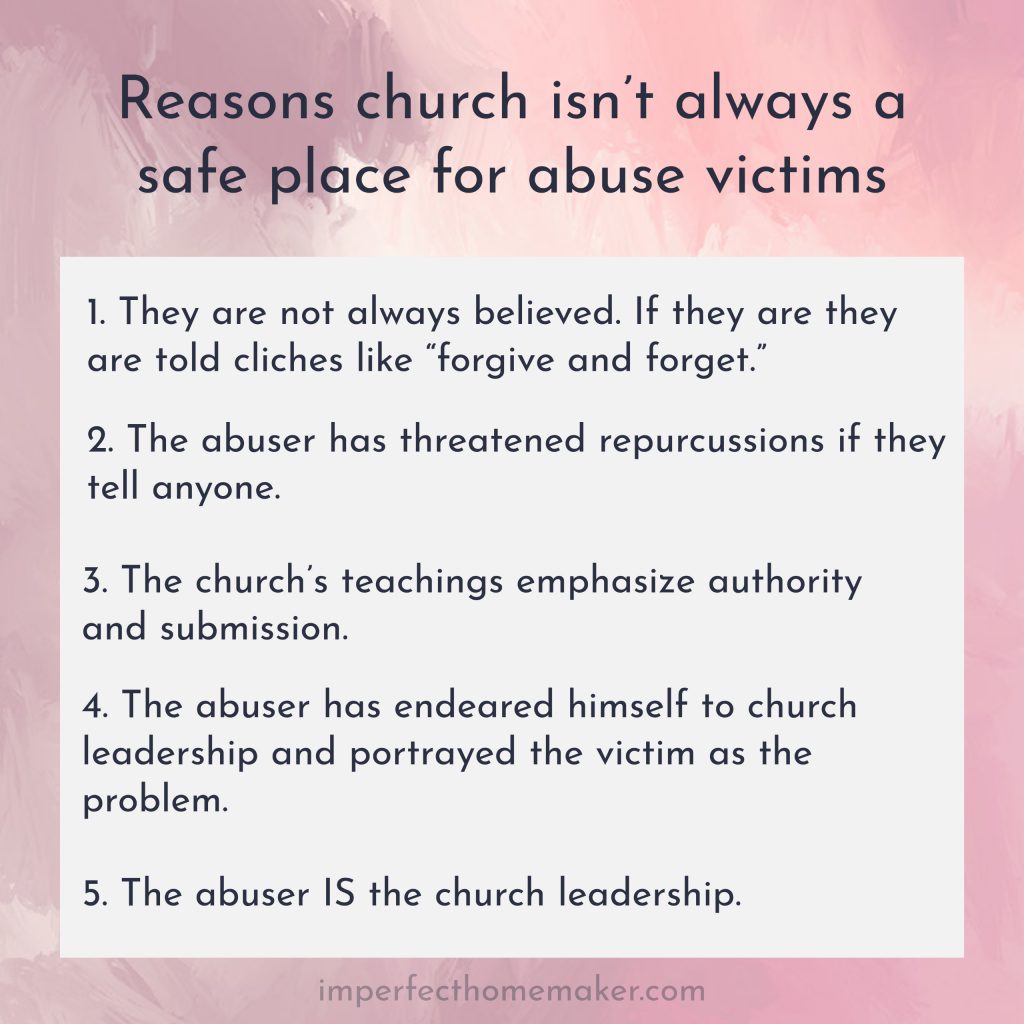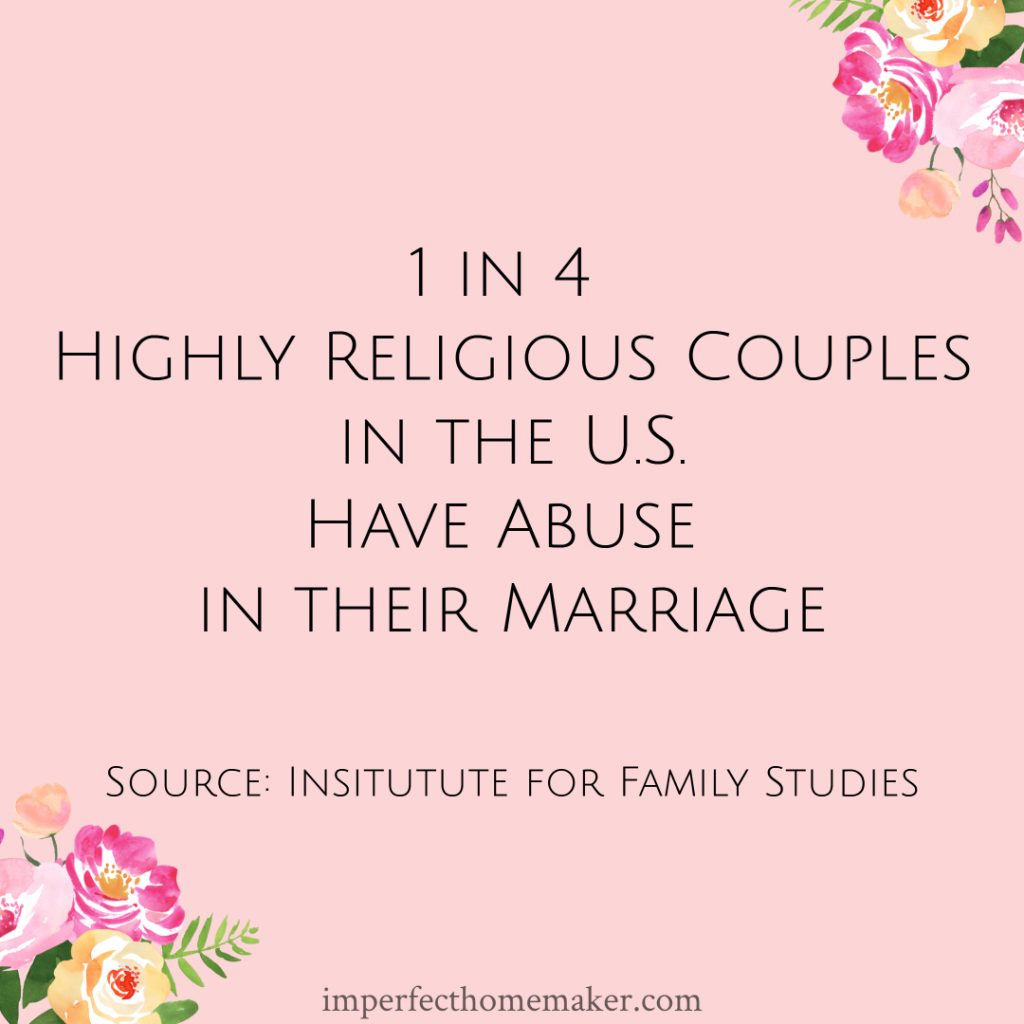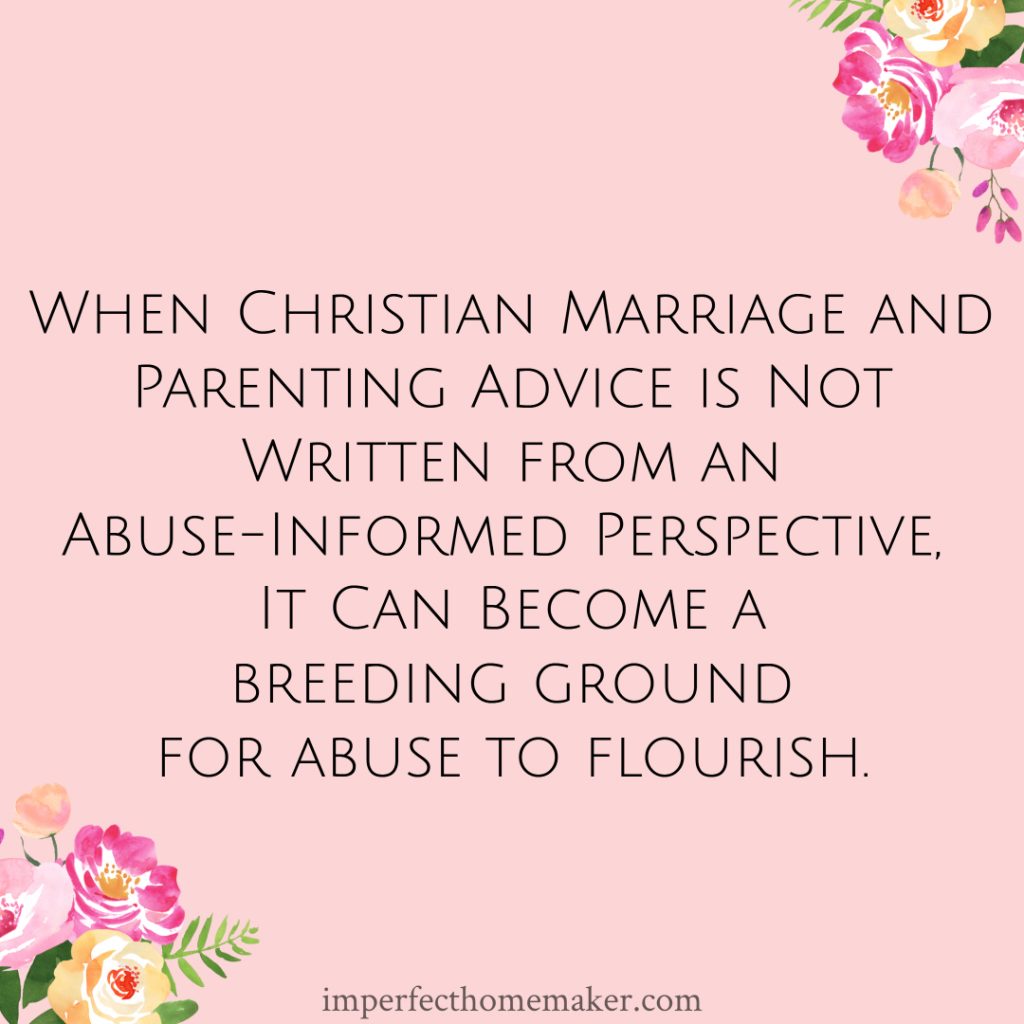Here’s Why Domestic Abuse Victims Have a Hard Time Getting Help at Church
On Sunday, I posted on Instagram about women who find themselves in the bathroom stall at church, crying because their abusive husband is smiling, chatting, and fitting right in with all the men in the lobby. But she knows the truth. She knows that the person he pretends to be at church is not the same person he is at home.
A response I received was, “Why doesn’t she go to the church leadership for help?”
While that might seem an obvious solution, it’s unfortunately not usually that simple.
I reached out to a group of abuse survivors and asked them to share their answers to the question, “Why doesn’t a victim go to her church leadership for help?”
So far I’ve received over 200 responses, and they keep coming.
I sorted these responses into categories to make it easier to see the difficulties for an abuse victim in asking for and receiving help from her church. Some of what you read are direct quotes; some are paraphrases. There is not a single response on this page that was not submitted in some variation by multiple people. These are not the outliers; they are responses that victims receive nine times out of ten.
My goal in sharing this is to help raise awareness that these women are in your church. I hope that by understanding how great the obstacles are, you can be the one to help create change so that the church can be a safe place for those who need protection and care.
“They did not believe me.”
“They did not want to get involved.”
Even though the staff believed me, they added a ton of chaos to the situation. Didn't listen to me or experts on how to handle the situation which my kids and I even more unsafe. Tried to control what I did. It was horrible.
“They told me to keep being a submissive wife.”
“They told me not to talk negative about him.”
I was a child of DV. My dad was adored by our church. I went twice to the “lead” pastor, begging him to help us. He told me, “You can’t tell anyone about your dad’s sin because it’ll be too hard for him to repair his reputation once he is repentant.”
“They told me to read a book that would fix my marriage.”
“They prayed with me and then never said anything else about it.”
I told the pastor my then husband was raping me, hitting me, holding knives to my throat and guns to my kids heads. The pastor told me the Bible made no exceptions for divorce for anything other than continuous adultery and I was not free to leave for abuse.
“They said I neeeded to forgive and keep going as if nothing has happened.”
“They asked what I did to make him treat me like that.”
My pastor: “Wouldn’t you rather suffer some temporal abuse in this life than for you and your children to suffer eternity in hell if you leave the spiritual protection of your male headship and marriage?”
“They recommended I clean the house more and have more sex.”
“They ignored me and later terminated my membership.”
“He had beaten my children but they told me I shouldn't be separated from him.”
The church kicked out [my friend] for daring to divorce her abuser, then sided with the pedophile to convince the judge to force reunification with the daughters he molested.
“They told me it would be unsubmissive to pay the bills so I could have power and water to take care of my children, because my husband said I wasn't allowed to.”
“They told me if I took my child to the doctor wen he needed medical attention that I was usurping authority over my husband, because my husband said no.”
Over the course of my 30 year marriage, I went to at least 3 different pastor's wives, two different pastors, a Christian counselor, a church counselor, and numerous church friends seeking help. All efforts were concentrated on my staying, learning to cope with the situation, becoming a better wife, and trusting God to change his heart.
Another reason that victims of abuse did not simply go tell their church leadership:
I WAS AFRAID TO TELL
“I knew there would be repercussions for me if he found out I had told.”
“I shared some of the smaller things to see how they responded and they minimized it. I knew at that point that it would not be safe to share any more of what was going on.
“I already knew they would support him and ostracize me. I would rather be alone crying in the bathroom than to be ostracized by the whole church.”
“It’s exhausting to try to explain it. You’re vulnerable and don’t know who you can trust. I was afraid I’d be accused of running him through the mud.”
Trying to explain an abusive relationship to someone whose never experienced it is like trying to explain the difference between red and blue to a blind person.
Yet another issue was this:
I KNEW THE LEADERSHIP’S BELIEFS ABOUT MEN AND WOMEN WOULD MAKE IT IMPOSSIBLE TO RECEIVE HELP
“They portray women as irrational, high maintenance and hard to please.”
“They glorify abusive behaviors as ‘Biblical manhood.'”
“The doctrine of the husband being in authority over the wife meant they would view me as the problem if I refused to do what he said.”
“There’s so much emphasis on submission and laying down your life that I believed it was my responsibility to suffer silently.”
“I went to Bible study with his handprints around my neck. They prayed for my submission.”
From the pulpit, the pastor stated that abuse was a valid reason for divorce but went on to say. “Some people say they're being abused but they aren't.”
Another reason victims do not tell is that they know
THE ABUSER HAS ENDEARED HIMSELF TO CHURCH LEADERSHIP
“He is buddy buddy with the church leadership. He shows up early for every church function. He sets up chairs beforehand and helps sweep floors afterward. He has already shared mournful prayer requests about his wife’s “mental Illness” or “spiritual problems” to turn people against me before I could ever ask for help.”
“My abuser had preemptively spoken to every pastor at my church under the guise of praying for me saying I was struggling with anxiety and our marriage was suffering because of “my mental health issues”. By the time I was out of the fog and ready to admit I was being abused their opinions had already been tainted.”
“Through his charismatic ability to influence and manipulate his perspective of our marriage to church leadership, my ex successfully was able to have church leadership and the congregation turn their backs on me without me even knowing what his whispers were doing. I was devastated. He managed to convince our church that I was a horrible person… a slut, crazy, bad mother… and for them to pray with him to pray for me.”
“He was always speaking with them behind my back and making me out to be crazy. They were inexperienced with abuse and always excused his behavior.”
My husband is a world class actor and can portray himself to be a godly man.”
Finally, one of the reasons victims cannot always “just go tell the church leadership” is that
THE ABUSER *IS* THE CHURCH LEADERSHIP
“My husband was the pastor”
“Where could a pastor's wife go?”
“All the people in leadership that I told thought his abusive behaviors were normal. They treated their own families the same way.”
As the child/teen of a couple in leadership: I didn't dare go to church leadership because THEY WERE LEADERSHIP. It was also pounded into my head from a very early age about how children of “good Christian parents” grow up and are brainwashed by “a therapist” or “secularism” to make false abuse accusations against these “good, innocent” parents. False accusations, false memories, etc were a frequent topic of warning in our home. Who would ever have believed me?
My friends, I grieve that such egregious harm is being done and that the vulnerable are being further oppressed.
I hope you grieve also.
We must not be ignorant that there are wolves who wander amongst the sheep in disguise. Instead of rushing to defend the reputation of a person you thought was good, be willing to experience the discomfort and disorientation of acknowledging that someone is not who you thought they were.
We must stop throwing cliches around as easy answers to the problems people face.
We must understand how to recognize abuse so that we do not address it as a marriage issue. Many victims are attempting to disclose abuse, but it is missed because it sounds to the untrained ear like a small problem and she is told she shouldn't be petty.
We must understand that many pastors have sought such a position becaue they are power hungry. While they may sound like godly men from the pulpit, their actions behind the scenes are controlling and manipulative. Such people must be exposed and removed.
There is much more that could be said, but this is only the beginning of my journey of using this platform to speak about such topics.
I hope you will prayerfully follow along, asking the Holy Spirit for understanding and humility so that we may care for the vulnerable in ways that truly point them to the love of God for them.
A New Direction for Imperfect Homemaker
I have not written any new posts here for quite a while. The reason for that is that I am not the same person who started this blog over a decade ago. I knew this was likely to happen, that I would grow and change and view certain things differently, and that I’d likely disagree with some of the things I wrote in the past.
I have always tried to write from that perspective – that I’m not an expert who is here to share unchanging truth with my readers, but that I’m just a woman who is continually in the process of learning. Everything I’ve written in the past has been a milestone of where I’ve been at that moment in time.
And now I’m further down the road of life and I’m in some different places than I’ve been in the past.
Namely:
The title “Imperfect Homemaker” is now less about my struggle to be better at cooking, cleaning, and taking care of the kids. A better way to define myself as an imperfect homemaker now is that I don’t fit the traditional concept of a homemaker and that many people would probably consider me a rebel. Yes, I still stay home and take care of most of the household duties and childcare, but I no longer do it because I believe that is my role as a woman. I believe fathers and mothers should both be homemakers – loving their children, tending to the household chores, and ministering to others in partnership with one another. Strict roles where the man is the breadwinner and decision maker and the woman is the housekeeper and decision follower are not something I find prescribed in the Bible.
I still agree with the bulk of what I’ve written here; however, I’d write many things with far greater nuance now. (And there are a few things where I’m on a completely different page from my former self.)
Much of the standard fare written toward Christian wives and moms lends itself to either tolerating abuse from one’s husband or toward engaging in abusive behaviors as a parent, and that includes some of the articles I’ve written here in the past.
That’s not to say that every woman who reads these things is destined to be abused by her husband or will automatically be too harsh with her children.
However, because of the ministry to abuse victims that God unexpectedly launched me into around 5 years ago, I’ve seen a lot of things I can’t unsee. I’ve learned how concepts that might seem innocent in one family are bondage and destruction to others. I’ve seen firsthand how frighteningly common abuse is within the church, and I can’t be quiet about it, or about certain teachings that allow it to flourish so easily.
I never figured out how to make my new ministry of speaking on these topics fit into this particular space. I still enjoy talking about how to be productive and organized. I like a pretty, traditionally feminine aesthetic, even though I don’t believe that’s a component of being a “Biblical woman.” Talking about domestic abuse and critiquing harmful teachings just didn’t seem to fit in here, but I don’t have time to do both, which means that the content I produce in this space has dried up.
I don’t want to close this space down, though. I’ve gotten to “know” (virtually) so many of you over the years, and I’d sure love to continue to have good conversations with you.
But for the sake of authenticity, for the sake of time, and for the sake of bringing awareness of these topics to the Christian women who follow this account, I believe it’s time for me to change the direction of the content here. I’ll be sharing more posts about the very serious issue of domestic abuse in Christian homes, and I’ll be starting conversations where we can rethink common marriage and parenting advice that allows such abuse to flourish so easily.
My older content re-circulates automatically on Facebook, and if I catch something posted there that I no longer agree with I delete it.. (Feel free to message me if you see something I miss!) As I have time I hope to re-write some of it, but for now I just try to keep old articles that I disagree with from surfacing into public view.
I realize that some of these new conversations here might get uncomfortable. They might challenge some of your long-held beliefs. (I have been walking this road for quite a few years, so I know how uncomfortable it can get.) I understand that for some of you, you may disagree so vehemently that you no longer feel you can read my content. There’s no hard feelings from my end if that’s the case. I don’t wish to convince anyone of anything they don’t wish to be convinced of. But if you enjoy the challenge of thinking through hard things, especially with the goal of protecting our fellow sisters in Christ, then I am excited to engage in these conversations with you!
Why “How to be a Good Wife” Might not be the Right Question
“How to be a Good Wife” is a question I sometimes receive here, and it's a question I see come up frequently around the internet.
Generally I explore that question one-on-one with the person at the other end of my inbox. I find out more about why they're asking, and we have a conversation about it that is relevant to the details of their specific situation.
But for those who are searching publicly available books and articles to find answers to their pressing question about how to be a good wife, I want to address some of the common themes that I see regarding this question.
Basically, I have two main points:
- Sometimes asking how to be a good wife is a great question to ask!
- Sometimes asking how to be a good wife is not the right question for your situation.
So let's dive into what I mean, ok?
When I was first married, being a wife was all new to me. I loved my husband so much, and I wanted to be the best wife I could be for him. He also wanted to be the best husband he could be for me, and we set about learning and growing together as a couple. We would talk about our likes and dislikes, and we would ask each other questions to learn more about how we could better serve the other person.
Because we loved one another, we wanted to please one another, and we learned everything we could about how to best do that. As the wife in the relationship, the question from my end was how could I be a good wife, and it was a good and healthy question to ask myself.
Yet even in a relationship where both of us were mutually loving and serving the other, I discovered a pitfall where the question of how to be a good wife could be taken too far. This pitfall came in the form of books and articles that are written to Christian wives. Now, I'm not saying that no one should ever write books or articles for Christian wives (it's what I'm doing right now, after all!) But what I discovered was that many of these Christian women's books go far, far beyond what the Bible actually teaches. Instead, they offer up collections of opinions that pass as “Biblical” teaching but are really man-made (or woman-made) rules about things that a good wife should do.
My husband and I are both book lovers, and we hadn't been married long when we came across a thrift store that had piles and piles of books that were all free! Wow! I was in heaven! Because the books were free, I was pretty quick to add anything to my cart that was by a Christian publisher, whether I was familiar with it or not. I figured if they weren't any good I could toss them later.
My husband was the bread-winner and I chose to be a stay-at-home wife. This meant that before I had children I had lots of time to read. But I wasn't just sitting around relaxing; I was reading all the books from that thrift store that teach women how to be good Christian wives. I wanted to learn as much as I could! But boy, did I have a rude awakening. These books weren't teaching how to be a good wife at all. Their implicit and explicit messages were teaching that men have “needs” and that wives were created to meet them. They were teaching that to be a good wife meant submitting to your husband even when he is harsh, cruel, and selfish (aka letting him always have his way like a spoiled child.) That isn't what it means to be a good wife; that is enabling your husband's sin and selfishness. (I just read this fantastic Facebook post that speaks more on this subject.)
I haven't picked up any of those books for many years, but recently I've pulled some of them back off the shelf because I get messages sometimes asking me what I think about some book or another. Inside I find the scribblings I wrote all those years ago refuting what the author had said. I wrote things like, “That's not in the Bible, but they keep using the words ‘biblical advice', which puts a guilt trip on the reader, making them feel that if they don't follow this man-made list of ‘rules for good wives', they'll be disobeying God!”
There were plenty of books with overt messages teaching women to cater to selfish, domineering husbands. But perhaps even more dangeous was the subtlety of all of the books with more palatable, yet still wrong, messages about what it means to be a good wife. These are everywhere. In bygone years, I have written such articles myself right here on this blog. These are the articles and books that tell you that you need to keep your house cleaner. That you should be a wise steward of your family's money. That you should make your home warm and inviting. Don't get me wrong – these things are not bad. But what I've seen in my own life and many other women I know is that the cumulative message of all of these books and articles is that being a good wife is about what you do.
However, being a good wife isn't about doing more, more, more.
Being a good wife is about who you are. The point is not to “do all the things” in order to build up your home. The point is that when you seek to be a wise woman, the natural result is that your home will be built up.
Ok, so far I've addressed that asking “how to be a good wife” can be a good question when the dynamic is that both the husband and wife are simply seeking to know how they can best love and serve one another.
I've noted that even with this dynamic you need to be aware of the pitfall of thinking that your value as a wife is found in the things that you do.
Now I want to address a different marriage dynamic in which many women find themselves.
This is the dynamic where the husband believes he is king of his castle and that his wife exists to serve him. In this relationship, a husband has expectations for his wife that can extend into any area(s) of her life. For example:
-What she cooks
-The way she cleans
-The way she dresses
-Who her friends are
-Which groceries she buys
-Where and when she goes places
-How she manages her health, weight, or fitness
-And so many more.
These expectations may or may not be verbalized, but the wife in this relationship knows that her husband expects her to behave a certain way. How does she know this? Because when she does not meet those expectations, there are negative consequences.
Over time, she recognizes a pattern that when she has not pleased her husband, she may receive some form of the following:
-Silent treatment
-Withholding intimacy or on the flip-side, forced sex
-Verbal abuse or put-downs
-Rage
-Intimidation and threats
-Physical aggression – punching holes in walls, breaking things, driving dangerously
-Physical abuse (note: he doesn't have to punch you for it to be physical abuse. Examples: pulling hair, dragging, grabbing, pushing, spitting, blocking in a room, pinning against a wall)
My friend, let me put it honestly. If you are in a relationship like this, you are experiencing what is called coercive control. A husband who acts this way is abusive. I strongly urge you to read more about what coercive control looks like here.
I have received messages from wives in this type of relationship, and the question is almost never, “How can I stay emotionally and physically safe?” The question is usually, “How can I be a better wife?”
See, a husband who believes he is entitled to having everything he wants, when he wants it, the way he wants it, will always use manipulative words to turn everything he doesn't like in life to be his wife's fault. At first, she will find ways to explain hurtful situations to herself when they happen. “Oh, I must have misunderstood him. Surely he couldn't have meant it that way, right?” But as time goes on, hurtful things continue to happen, and every time he tells her it's her fault, she begins to wonder if maybe she really is the problem.
“Maybe I just need to be a better wife.”
“If I could just be:
-More respectful (which to an entitled husband just means more catering to whatever he wants)
-More organized
-A better cook
-Better at managing my time
-More sexy
-etc.”
“Maybe he has a reason to be irritated with me, and I just need to get my act together as a wife.”
This dynamic is when asking how to be a good wife is not the right question.
If your husband is controlling, selfish, a chronic liar, or has a pattern of engaging in otherwise hurtful behavior, you are not the problem.
I'm not saying that you've never sinned or never made a mistake as a wife.
I'm saying that searching for ways to be a better wife will not make your husband stop being selfish, controlling, deceptive, and hurtful to you.
If the above relationship sounds like yours, it's time to stop asking how to be a good wife, and it's time to start asking what you are going to do to get physically and emotionally safe.
And if you are the friend of someone who confides in you about her husband's chronic mistreatment, don't give her books about how to be a better wife.
There's a big difference between serving your husband because you want to, and doing it because he's going to be mad if you don't.
One is love, the other is slavery.
When your solution to a demanding and entitled husband is to work harder and harder to meet his expectations, you are catering to his ungodly belief system — the belief that all of life revolves around him, and that you are responsible for his happiness. He is idolizing you as the source of his happiness and fulfillment, and his goal, although he might not even realize it, is for you to idolize him by centering your all of your thoughts and actions around appeasing him like an unpredictable god.
So, if “How to be a better wife” isn't the question to be asking in a marriage like this, what can you do?
Here are some excellent resources that can help you get started sorting out your situation and deciding what your next step should be:
The Emotionally Destructive Marriage by Leslie Vernick
Is it Me? Making Sense of Your Confusing Marriage by Natalie Hoffman
Lots of Resources at Hope for Hurting Wives
If you'd like to talk with someone, you can request an advocate from Called to Peace Ministries.
It is possible to be a good wife and to be safe at the same time.
It is possible to love your husband well while also saying no to his sin and selfishness.
Summary:
1. Asking yourself how to be a good wife is a great question in the context of a mutually loving, serving relationship.
2. Asking yourself how to be a better wife is not appropriate if your focus is on doing rather than on being. (Read this post for further explanation.)
3. Asking yourself how to be a better wife is not appropriate if your purpose is to try to stop your spouse from mistreating you, lying to you, neglecting you, or being hurtful to you in any way.
4. Asking yourself how to be a better wife will not change the wrong beliefs of your spouse.
5. If you recognize a pattern in your relationship where you keep thinking that if you were only ______ (more organized, a better cook, quieter, thinner) then maybe your husband wouldn't be in such a bad mood, there is hope and help for you (but it won't come in the form of a book teaching you how to do those things.) I highly recommend speaking with a trained advocate one on one who can help you assess the seriousness of your situation and help you determine your course of action.
If you're curious to learn more about what an abusive relationship might look like in a home that is supposed to be Christian, and want to learn how you can help someone in this situation, sign up for the email series below:
Is Swagbucks Legit? How I Paid for my Kids’ Christmas This Year
I was asked recently whether Swagbucks was a legitimate way for stay-at-home wives and moms to earn money. My answer at the time was “Nah. It's not really worth the time.” It's not that the site itself isn't legit (it totally is – I've had an account for years and received any payouts I've requested) I just didn't feel like most people would earn enough to make it worth the time spent. Most of what I had earned was from referral credits I accumulated when I owned a deal blog years ago, and I didn't think it was fair to give the impression that the general public would earn as much as I had.
Well…fast forward a little bit and I've totally changed my tune!
I tried using Swagbucks for a month to see how much I could earn doing only things that anyone can do.
It was enough to pay for all my kids' Christmas and birthday gifts!
Once again, the money I earned was from doing things that anyone can do, and I didn't spend an exorbitant amount of time doing them.

Now…you're not going to get rich off Swagbucks or really earn an actual income, but if you're just hoping for a little “mad money” then I think you're going to find Swagbucks to be an amazing little hobby that you can use to afford Christmas presents or some other little “extra” you may not normally be able to afford.
Maybe you're wondering what in the world Swagbucks even is. A basic explanation is that you complete online activities such as taking surveys or searching the web through the Swagbucks search bar. When you do, you are awarded with…well… Swagbucks. Then you can redeem those Swagbucks for gift cards or actual PayPal cash.
I'm going to share the specific ways I have found to make using Swagbucks worth my time. I know we are all busy, but I also know many of us could use a little extra cash. So hopefully making use of Swagbucks will be a blessing to your family as I share some of the most time-effective ways to earn a little extra money.
1. First things first, create a Swagbucks account here. (Important note: If you want to redeem your Swagbucks for PayPal cash rather than gift cards, make sure you sign up with the same name and email address that is on your PayPal account.)
2. Get familiar with the point value. (1 Swagbuck = 1 cent, so 500 Swagbucks are worth $5.00)
Each activity will tell you upfront how many Swagbucks you'll receive if you complete it.
Ready to start earning Swagbucks? Read on for the best ways I've found to rack up your total quickly!
3. Go to “Discovery” Tab.
What you'll want to do is look for high paying offers and easy tasks. When these two overlap, that is the sweet spot!
So, for instance, I would consider 500 ($5) or more swagbucks a decent amount — although, the higher the better of course. I've earned up to 10,000, which is $100!
Notice all the squares underneath. These are all the offers available. When you click on one, it will show a little pop-up box with all the details of that offer.
Here's what that looks like:

This particular offer says that if you download the Upside app and use it when you purchase gasoline, you will receive 1000 Swagbucks ($10.00.) It will cost you nothing to use the Upside app; the only purchase you're making is for gasoline, and you'll make an extra $10! Not bad for taking the time to download an app!
More examples of tasks I've done that have provided a large return for a small investment of time:
-Download apps (earn an average of $2.00 each)
Be sure to read the terms. Sometimes there is a requirement to play to a certain level of a game before you're awarded the Swagbucks. I don't find these to be worth my time. I prefer to choose offers where I can download the app, receive the Swagbucks, and then delete the app.
-Sign up for a company's email list (earn $.25 – $1.00 each)
You can set up a separate junk email address for these so you don't fill your regular inbox with junk mail.
-Sign up for a free trial to a streaming service (earn $5 – $10 each)
I always set up a calendar notification to remind me to cancel before the free trial is over.
-Sign up for a food delivery subscription (earn $30 – $60 each)
I do the math to make sure I will be earning more than I spend on the box. Usually there are special offers on the boxes that make them very inexpensive. For instance I just did one where I spent $13 to get the first box delivered. I'll earn $60 from Swagbucks and then cancel the subscription, making it a $47 money-maker.
-Click and earn offers (1 to 2 cents each.)
There are many of these available to do. All you have to do is click on a link for an advertisement and you'll immediately earn 1 or 2 swagbucks just for clicking. Why do I do these when they only pay a couple cents? Because it only takes a second or two to click. A penny per second equals a $36/hour pay rate. Even if I only spend a few minutes doing this, it's completely worth my time. All the Swagbucks add up.
-Upload receipts. I don't always do this, but if all the other offers are sparse I will take a few minutes to upload some of my grocery receipts. Depending on what I've purchased I might earn around 20-25 cents on each receipt.

-Take surveys. This is one I personally don't do that often, but other people I know find that they earn enough on Swagbucks surveys to make them worth their time.
-Use the online shopping portal. Any time I need to make an online purchase, I go to my swagbucks account first, or I click through my chrome extension. Swagbucks will reward me with a certain number of swagbucks just for shopping through their portal.

If you install the Chrome extension, you will see a pop-up like the one on the right hand side of the above web page. Any time you're shopping online you can click that purple cash back button, and you'll receive Swagbucks back in your account after you've made your online purchase.
If you don't wish to install the Chrome extension, you can just go to your Swagbucks account and click through the shopping portal.
Things to be aware of when using Swagbucks:
-There will be many, many offers that are not worth your time or trouble. Don't be disappointed, just keep looking because the great offers are in there among the not-so-great.
-As I already noted, you'll probably want to use a junk email address when signing up for advertiser's email lists. Additionally, it's my personal preference not to sign up for magazines or free samples where I have to give my mailing address. (Ordering an actual product is different.) But for the free sample type things, I feel like I start receiving a lot of additional junk mail when I give my address out.
-Always, always read the terms of an offer. You'll need to follow the instructions correctly in order to receive your Swagbucks. For example, it might say to sign up for a free trial of a service, but then in the fine print it will say that you have to stay subscribed past the first month in order to receive the Swagbucks. (These can still be worth it; just check the price. For example, if I stay subscribed for one month to a service that is $5 a month, but I'm earning $20 in Swagbucks I'll still do it!)
-Take a few minutes to keep yourself organized. Keep track of the offers you've completed and make a note on your calendar to make sure your Swagbucks have been awarded. (Occasionally something doesn't track properly and the Swagbucks might not show up in your account. If this happens, I just do a chat with Swagbucks customer service and they have always fixed it right away!)
Here's a screenshot of my Swagbucks earnings. (That's worth over $1,100 that I've redeemed in the form of Paypal money.) In the upper right hand corner, you can see an additional $83 worth of Swagbucks that I have not cashed out yet. And I also have another $100+ worth of pending Swagbucks that will post when the 30 days of a free trial offer is complete.

If you're tight on money and are looking for a legit way to earn a little bit extra from home, I highly recommend giving Swagbucks a try!
Here is the link once again to sign up —> Click Here to start earning Swagbucks!
A Wise Woman Builds Her House
Every wise woman buildeth her house: but the foolish plucketh it down with her hands. (Proverbs 14:1)
Perhaps when you read that verse, you think something like, “If I want to be a wise woman, I need to build my house. Hmm…how do I build my house?”
I’ve asked for people's thoughts about this verse on social media before, and all of the answers I received were along the same line. Everyone was thinking something like, “A woman can build her house by doing a, b, and c” ; and the a, b, and c were things like:
- Put others’ needs first
- Keep my home clean and clutter free
- Make my home inviting for the family
- Do things together as a family
- Have supper together every night
- Schedule in rest time, family time, chore time, Bible time, and exercise time
- Control my mouth – speak kindly to others and don’t complain
- Be organized
- Be frugal
- Prepare nice meals for my family
Now, there’s certainly nothing wrong with doing these things. Speaking kindly to your family, spending time together, and using your time wisely are all beneficial things to do for the ones you love.
But if we are not careful, we can fall into a great big trap of believing that our godliness as a homemaker is proven by how many boxes we can check off on a list.
I want you to understand that the “godly homemaker list” only brings bondage. The more things you manage to check off the list, the more things you will think of to add to it. – “I did a, b, and c, but my family would really benefit if I also did x, y, and z.” If you believe that you must figure out ways to build up your home in order to be a wise woman, you will forever find yourself unsatisfied (because you will always think of some good thing that you're not doing!)
When you measure your success or failure by a list, you are setting yourself up to fall into one of two ditches:
1. Perpetual guilt that you can't seem to do all the good things on your list.
2. Pride that you are doing good things better than someone else is.
When you measure your success or failure by how many “homemaker-y” things you do and how well you do them, you've got things backwards.
You see, when you try to figure out ways to build your house and work hard to do them, you are living life out of our own wisdom and strength.
Except the Lord build the house, they labour in vain that build it…”
Psalm 127:1
We can never build our houses apart from the Lord, and we cannot be wise apart from him.
For the LORD giveth wisdom: out of his mouth cometh knowledge and understanding. (Proverbs 2:6)
So, my friend, how do you build your house?
You walk in the wisdom of God.
Through wisdom is an house builded: and by understanding it is established. (Proverbs 24:3)
Listen to the words of Jesus:
•Come unto me, all ye that labour and are heavy laden, and I will give you rest. (Matthew 11:28)
•Abide in me, and I in you. As the branch cannot bear fruit of itself, except it abide in the vine; no more can ye, except ye abide in me. (John 15:4)
And here’s what Jesus says will happen when you listen to his words:
Therefore whosoever heareth these sayings of mine, and doeth them, I will liken him unto a wise man, which built his house upon a rock: And the rain descended, and the floods came, and the winds blew, and beat upon that house; and it fell not: for it was founded upon a rock. And every one that heareth these sayings of mine, and doeth them not, shall be likened unto a foolish man, which built his house upon the sand: And the rain descended, and the floods came, and the winds blew, and beat upon that house; and it fell: and great was the fall of it. (Matthew 7:24-27)
Do you see? When you try to build your house on any other foundation, it will not stand!
When you try to check the boxes of what you think a “godly homemaker” is supposed to look like, you’re building your house on the wrong foundation.
But when you build your life on the rest that Jesus Christ offers you; when you abide in him; when Jesus IS your life – everything else will flow from that!
The foolish woman focuses on DOING. Yet all her best efforts will fail.
The wise woman focuses on BEING. And because she is not living through her own efforts, but through the power of the resurrected Savior, she can never fail.
A plant doesn’t have to try hard to bear fruit. The only way a plant bears fruit is to simply be. The roots do the work of providing everything the plant needs to flourish and be fruitful. Likewise the fruit we bear can only and ever be a result of simply abiding in the vine.
“As ye have therefore received Christ Jesus the Lord, so walk ye in him: Rooted and built up in him…” (Colossians 2:6)
Does it feel impossible to do *everything* you're *supposed* to be doing?
Maybe it’s time to ditch the checklist and simply abide in the vine.
*Doing* all the things to build your house is not what makes you a wise woman. That's backwards.
But when your life is hidden in Christ – when you rest from your efforts to do, and you learn to simply be who you are (a new creation, filled with all the fullness of God!) – you will find freedom and rest like you’ve never experienced before!
Be a wise woman, my friend, and follow Jesus’ invitation to abide in Him.
When you do, your life will bear much fruit! You can cease from your efforts and stop living in either guilt or pride, and the people in your home will experience the power of Jesus' grace as it fills your own heart and spills over onto them.
If you want to read further on this subject, here a couple of great suggestions:
• Grace for the Good Girl: Letting Go of the Try Hard Life by Emily P. Freeman
• The Naked Gospel by Andrew Farley
How to Pray for Your Husband When He’s Not a Godly Father
In the past I’ve shared some characteristics of a Godly father that I've observed.
But what if your husband is not a Godly father? What if he:
-Disciplines the children too harshly
-Undermines your parenting
-Speaks disrespectfully to you and allows your children to do the same
-Does not show interest in teaching the kids spiritual things
-Does not spend time with the children
-Does not help you care for the children
No doubt it’s hard to watch your children not receive the loving care that they deserve from a father. No doubt it’s hard to do all the work to teach them and take care of them and not to receive any participation from your spouse.
I imagine that if your children’s father is this kind of a man that you have already spent time in prayer, asking God to change his heart and help him be the right kind of a father. (Read: 10 Ways to Pray for the Father of Your Children.)
But what if nothing is changing?
Where do you go from here?
What I am about to share is by no means a comprehensive answer. Without knowing you, I can’t possibly offer insight into your unique situation. I only want to give you some options to think about.
If you are unsure if there is something deeper at play, I encourage you to check out one of these books, which will give you much more information than I can provide here: (affiliate links)
–Is it Me? Making Sense of Your Confusing Marriage
In the meantime, here are some ways that you can pray for your husband when he is not a godly father.
1. Pray that the Holy Spirit would reveal areas of his life that are not submitted to God.
Sometimes an area where we ourselves have grown is not the same area where our spouse is growing at the moment. Maybe he is learning other things right now and the areas of needed growth that are so clear from your perspective are not something he has seen yet.
Important to note: God is faithful to answer our prayers; however, this is not a guarantee that your spouse will change. When God does the revealing, your husband must make the choice to act on what God reveals to him about his character.
Why doesn’t he change? God will never force anyone to change. Obedience to God is a voluntary choice, and it is up to your husband to make that choice.
What to look for: Is there evidence of spiritual growth in other areas of your husband’s life? I am not speaking of outward shows of religion. Anyone can read their Bible, pray, sing spiritual songs, and say spiritual words. These are outward behaviors. But is there evidence of an ongoing transformation of your husband’s inner life? When there is an area of his life that has not been a reflection of Christ, does he humbly repent and submit that area to the Lord? Although he may have areas that still need adjusting, is his overall demeanor characterized by the fruit of the spirit – love, joy, peace, longsuffering, gentleness, goodness, faith, meekness, temperance?
If there is not evidence of an ongoing inner transformation into the image of Christ, it is not likely that you will see him become more Christlike in his parenting either.
2. Pray that God will give you the words to speak to your husband.
“You are not your husband’s holy spirit.” Many wives have heard these words and believe that it is wrong for them to speak up when they see something in their husband’s life that is not Christlike.
But while it is true that it is not our place to dictate to another believer what he must and must not do, it is also true that as believers we are called to:
-exhort one another so that none will be hardened by the deceitfulness of sin (Hebrews 3:13)
-provoke one another to love and good works (Hebrews 10:24)
-restore the one who sins, in a spirit of gentleness (Galatians 6:1)
-speak the truth in love (Ephesians 4:15)
You can speak the truth to your husband in love, asking God to give you the wisdom to know what to say to him. (James 1:5)
If you feel that speaking truth into your husband’s life and calling him to a more Christ-like way of life will only make him angry or cause negative consequences for you, that is a much bigger problem, which leads me to the next point.
3. Pray that you will have wisdom to know how to protect your children.
If speaking up to your husband is only going to create negative consequences for you and your children, I encourage you to do what is necessary for everyone’s safety and well-being.
I am not saying to keep your mouth closed and go on living as if there’s nothing wrong.
I am saying that if your husband has already demonstrated in the past that his response would cause distress to you or your children, then there is no sense in trying an approach of talking to him. He has already shown what is in his heart. Your priority now is to protect your children.
He hath shewed thee, O man, what is good; and what doth the Lord require of thee, but to do justly, and to love mercy, and to walk humbly with thy God? (Micah 6:8)
Being an agent of mercy and justice for your children – protecting the vulnerable from one who is misusing his power over them – is a godly thing to do.
Do they need emotional protection?
Do they need physical protection?
Do they need spiritual protection?
Your unique circumstances will require a unique response. This is why praying for wisdom is so important. God has promised to give wisdom to those who ask him, so prepare yourself for His answer. Look for the places that He might be providing information you can use to make wise decisions that will protect your children.
4. Pray that your children will understand the love of God in spite of having an imperfect earthly father.
Many children struggle to understand the love of God when their earthly father is harsh or indifferent toward them.
Yet God shows his love to people in many different ways. He can show his love to your children through you, their mother (II Timothy 1:5). He can show his love through his beautiful creation that he has given for them to enjoy (Psalm 19:1). He has given them his written word by which he reveals his love for all mankind (II Timothy 3:15). Love them, teach them who God is, and point out to them the beauty of God’s love as shown in his creation of the world around them. Pray that they will understand who God is and that their tender hearts will not become hardened to the idea of having a relationship with him.
What if your husband is not a believer? You can pray the same prayers from this post either way. You can pray that God would draw your husband to himself, understanding that God will never force anyone to come to himself. You can pray that you would have wisdom to know what words you should or should not speak to your husband; you can pray that you will have wisdom to protect your children; and you can pray that your children will understand the love of God.
Dear Christian Mama,
I close this article with a prayer for you.
Father, I ask that you will give your wisdom to this reader. I ask that you will help her know that words she ought to say to invite her husband to a place of repentance. If her husband is willing to humbly grow in Christlikeness, I ask that you would give her a spirit of graciousness and not of criticism. If her husband is unwilling to submit to you, I ask that you would make that clear to her, and show her what she should do to protect her children's tender hearts as well as keep them physically safe. I ask that your presence would be unmistakeable in her life, that she would know your deep love for her and be able to pass it on to her children.
Amen.




















